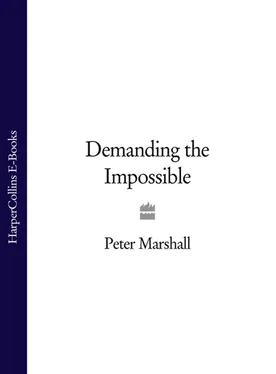Like the Taoists, Heraclitus saw change as a dynamic interplay of opposites: ‘cold things warm themselves, warm cools’. He concluded that since all opposites are polar they are united: ‘The up and the down is one and the same.’ 2 Change takes place dialectically through the dynamic unity of opposites. But while everything changes, there is also a natural order. He pictured the world as ‘an everliving fire, kindling in measures and going in measures’. 3 It is the ‘reason’ or ‘destiny’ which keeps everything in order and ensures the orderly succession of events. Although Heraclitus had a pessimistic view of the human condition, which earned him the title of ‘weeping philosopher’, he is the first philosopher in the Western tradition to anticipate the anarchist belief that constant change takes place within a natural order. But he was no democrat and was very scornful of his contemporaries. Only force could make them act for their own good: ‘Every beast is driven to the pasture with blows.’ He believed strife is justice, and celebrated war. ‘War is the father of all and the king of all; and some he has made gods and some men, some bond and some free.’ 4
The case for Socrates as a libertarian is founded on his insistence that one should question authority and think for oneself. He offers the earliest defence of liberty of thought, insisting on the indefeasible right of conscience of the individual and the social importance of criticism and discussion. Although Socrates was an elitist-he opposed the democracy which triumphed in Athens in 403 BC – he bravely opposed his private judgement against the Athenian State. In 399 BC he was persecuted and put to death for being an atheist and a corrupter of youth. His ‘crime’ was to have argued that we should approach everything with an open mind and examine popular beliefs in the light of reason, undeterred by the dictates of authority or the opinions of the majority. When Socrates said that it was necessary to live by the law and die by the law, he was not simply asserting the need for law for its own sake. In keeping with his characteristic irony, he wished to clarify the accusation made against him by the Athenian State and to bring out its true nature.
As Plato makes clear in his Apology , Socrates insisted on the supremacy of individual conscience so that no one should allow themselves to be compelled by any human authority to do what they think is wrong. He also emphasized the public value of free discussion since truth best emerges through the clash of opposing opinions. Socrates not only chose free discussion as his method of teaching but insisted that ‘Daily discussion of the matters about which you hear me conversing is the highest good for man. Life that is not tested by such discussion is not worth living.’ 5
Plato, Socrates’ most brilliant pupil, failed to heed his teacher’s advice. While the communism of goods and women in The Republic inspired some later socialists, Plato’s ideal State has a rigid social hierarchy ruled by a small elite of guardians and soldiers. It is moreover a completely totalitarian State with no freedom of thought or action: religion is chosen on utilitarian grounds and must be obeyed on fear of punishment or death. If Socrates appears as one of the great libertarians, Plato stands at the fountainhead of the great authoritarian river which subsequently swamped Western thought.
After the death of Socrates, the comparative freedom of discussion which prevailed enabled many schools of philosophy to flourish. The most significant were the Epicureans, the Cynics and the Stoics who all aimed at securing peace for the individual soul in a period of social turmoil. The Epicureans, Cynics and Stoics were extreme individualists for whom the State counted little; they celebrated the natural authority of the individual over that of the State. They looked to a world of universals in nature beyond civil society. Where the theories of Plato and Aristotle were for the improvement of a few, they extended their teaching to all men and recognized them as brothers.
Aristippus, active in the fourth century (born c .430 BC), was the founder of the Cyrenaic or Epicurean (also known as Hedonistic) school of philosophy which took pleasure to be the highest good. He was the first of Socrates’ pupils to take money for his teaching, but told Socrates that he did not wish to belong to either the governing or the governed class. He taught philosophy at Athens and Aegina, and spent much of his life in the court of Dionysus the tyrant in Syracuse, where he earned a reputation as a voluptuary. It was this experience which no doubt led him to teach that the wise should not give up their liberty to the State. His daughter Arete adopted his doctrines and passed them on to her son Aristippus the Younger.
The Cynics of the third century came even closer to anarchism. They did not develop into a school like the Epicureans and the Stoics, but they interpreted the two fundamental Greek concepts of Physis and Nomos in a radical way. Usually translated as Nature and Custom respectively, Physis can refer to the natural form of an object, a person’s nature, or the natural order of things; Physis can refer to usage, convention or law. Most Greek thinkers sought to reconcile these two concepts – Aristotle for instance wished to impose law on the natural occurrence of things. The Cynics alone however rejected Nomos in favour of Physis ; they wished to live purely ‘according to Nature’. Since the Greek polis was based on the rule of custom or convention, by rejecting Nomos , the Cynics denied the right of established authority to prescribe the limits of their actions. 6 Since laws are made by men and could have been otherwise, and customs vary from country to country, they held that they had no validity. They denied the competence of courts to judge actions and argued that all social laws, hierarchies and standards are without moral foundation.
The real founder of the Cynics was Antisthenes ( c .444–370 BC). He was the son of an Athenian father and Thracian mother. He fought at Tanagra in 426 BC, and died in Athens. A friend of Socrates, he turned his back on his former aristocratic circle in order to pursue simple goodness amongst working people. In his desire to ‘return to nature’, he preached at open-air meetings that there should be no government, no private property, no marriage and no established religion. He despised the artificial pleasures of the senses, declaring ‘I had rather be mad than delighted’. 7
His pupil Diogenes of Sinope became even more famous for his doctrines and his eccentric way of living. Like the Taoists, Diogenes condemned the artificial encumbrances of civilization. He decided to live like a ‘dog’, and therefore was called a ‘cynic’ which means ‘canine’. Rejecting all conventions, reducing his needs to a minimum, he is said to have lived in a barrel or ‘tub’, (probably a large pitcher used for burials). When Alexander the Great visited him and tried to corrupt him by offering anything he wished, he asked him ‘only to stand out of my light’. The simple beggar was no respecter of persons. He not only rejected the institution of slavery but declared his brotherhood with all beings, including animals. He considered himself to be a ‘citizen of the world’.
Diogenes was not therefore ‘cynical’ in the modern sense, for he pursued moral freedom in liberation from desire and fear, and was deeply anxious about the nature of virtue. As he saw it, only by being indifferent to fame or fortune can a person become truly free. But his teaching was not only aimed at the individual, requiring him to lead a simple and contented life; it had important social implications. One of his most famous paradoxes was his call to ‘deface the currency’. The son of a moneychanger, he wished to transform his father’s activity on a universal scale. The Greek for ‘currency’ was nomisma , derived from the word Nomos (custom). Since Diogenes felt that the standard of society was wrong, his call to deface the currency represented an attack on all prevailing customs, rules and laws. It was also coupled with a demand for complete freedom of speech and action. In his own life, he rejected the conventions of religion, manners, dress and even food. As a result, he may be considered one of the great forerunners of anarchism.
Читать дальше












